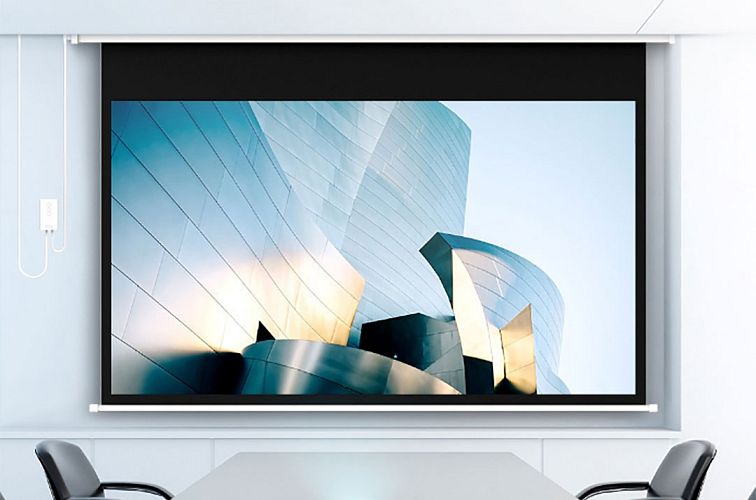
Projection Screen: How to Choose a Projector Screen?
The projection screen is an integral and final element in the chain of any projection system, the main purpose of which is to transmit an image that meets the highest quality standards. Projection onto any other surface can provide image transmission, but unlike a projection screen, it will never create a high-quality and uniform image on the projection surface of the projection screen canvas.
Basic requirements for projection screens
- Flat surface To display a high-quality and uniform image, the projection screen must have a perfectly flat surface that will facilitate the correct reflection of the light flux in a given direction without distorting the content.
- Large-scale image One of the main advantages of projection equipment over other display devices is the production of a large and high-quality image in combination with an affordable price. It is for this reason that all the capabilities of projectors are taken into account when producing projection screens.
- Image homogeneity Homogeneity is the uniform distribution of the light flux across the entire plane of the projection screen fabric.
- Projection screen fabric Despite the many types of coatings with different properties that can significantly affect the projected image, the main task of each coating is to improve the quality of the projected image due to the correct and uniform dispersion of the light flux across the entire plane of the projection screen fabric.
Electric projection screens
In electrically controlled projection screens, the projection surface is raised and lowered using an electric drive built directly into the housing. Due to the uniform tension of the projection surface on the shaft of the projection screen, maximum safety and wear resistance of the fabric is ensured.
This type of projection screens assumes fixed installation and is designed for wall and ceiling mounting. If the design of the room does not allow placing a projection screen in the ceiling or wall conditions, then the best solution would be projection screen models for hidden installation. A specialized screen housing is mounted in the sub-ceiling space and is virtually invisible when assembled. The design features of such projection screens offer a wide range of options for integration into various interiors.
Projection screens can be controlled using a remote control or using an integrated automation system in the entire equipment complex. If you need a large screen, then a projection screen with an electric motor is the ideal choice.
To achieve the best result, there are a number of models with constant tension canvases based on vinyl. This tandem will create a perfectly flat surface without bends and wave-like defects and ensure uniform distribution of the projector’s light flux over the entire plane of the projection screen canvas.
Projection screens with manual control
This type of projection screens raises and lowers the projection surface using a special spring-loaded mechanism, the quality of which will determine the precise fixation of the canvas at the desired height. Roll-up screens are easy to operate and inexpensive. This type of projection screens assumes permanent installation and is designed for both wall and ceiling mounting.
Projection screens with manual control are an economical solution and are equipped with fiberglass canvases. As a rule, the dimensions of such screens do not exceed 300 cm in width.
Tension screens on a frame
In projection screens with constant tension, the projection surface is stretched along the entire perimeter of the frame. The constant tension system in combination with the vinyl canvas guarantees uniform distribution of the entire light flux over the entire plane of the projection surface.
This design provides an ideal flat plane of the projection screen surface.
Mobile screens
This type of projection screens is used for mobile and off-site events, where it is necessary to quickly and easily assemble and pack the projection screen in a specialized portable case. That is why this type of screens is popular when organizing off-site events.
Mobile projection screens are an economical solution and are equipped with fiberglass projection coatings.






